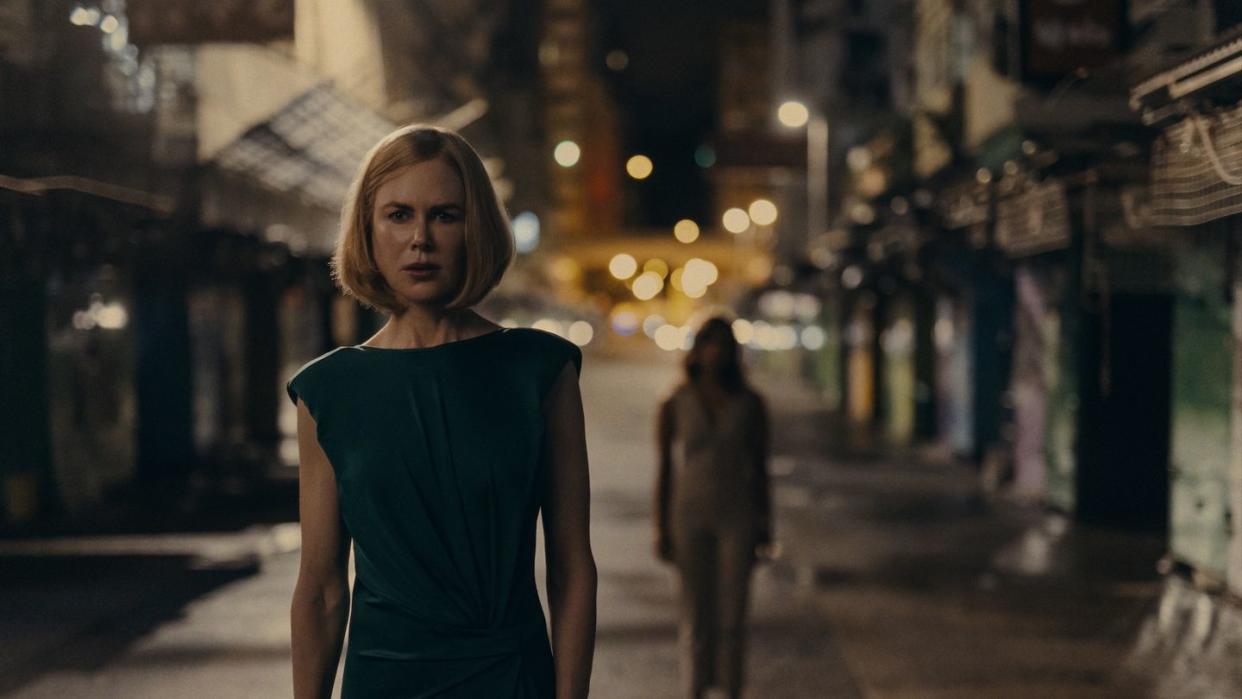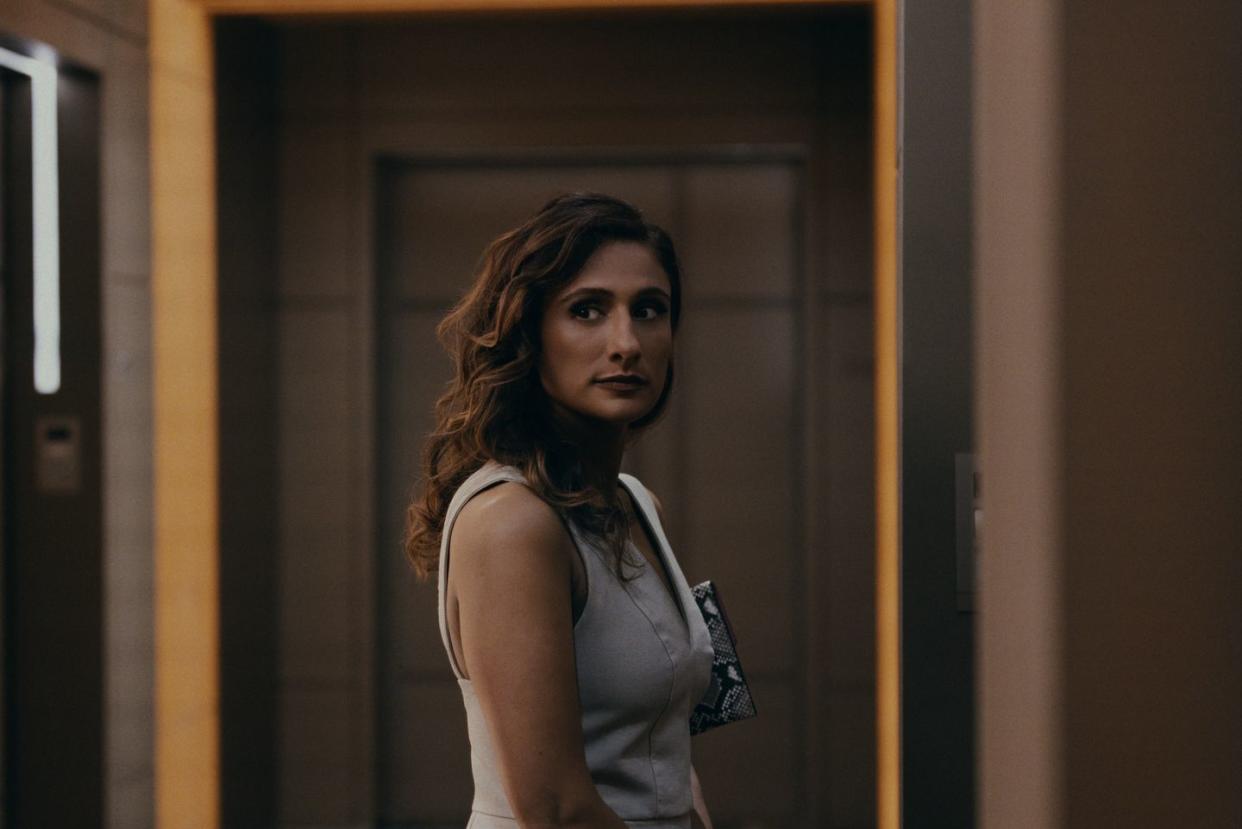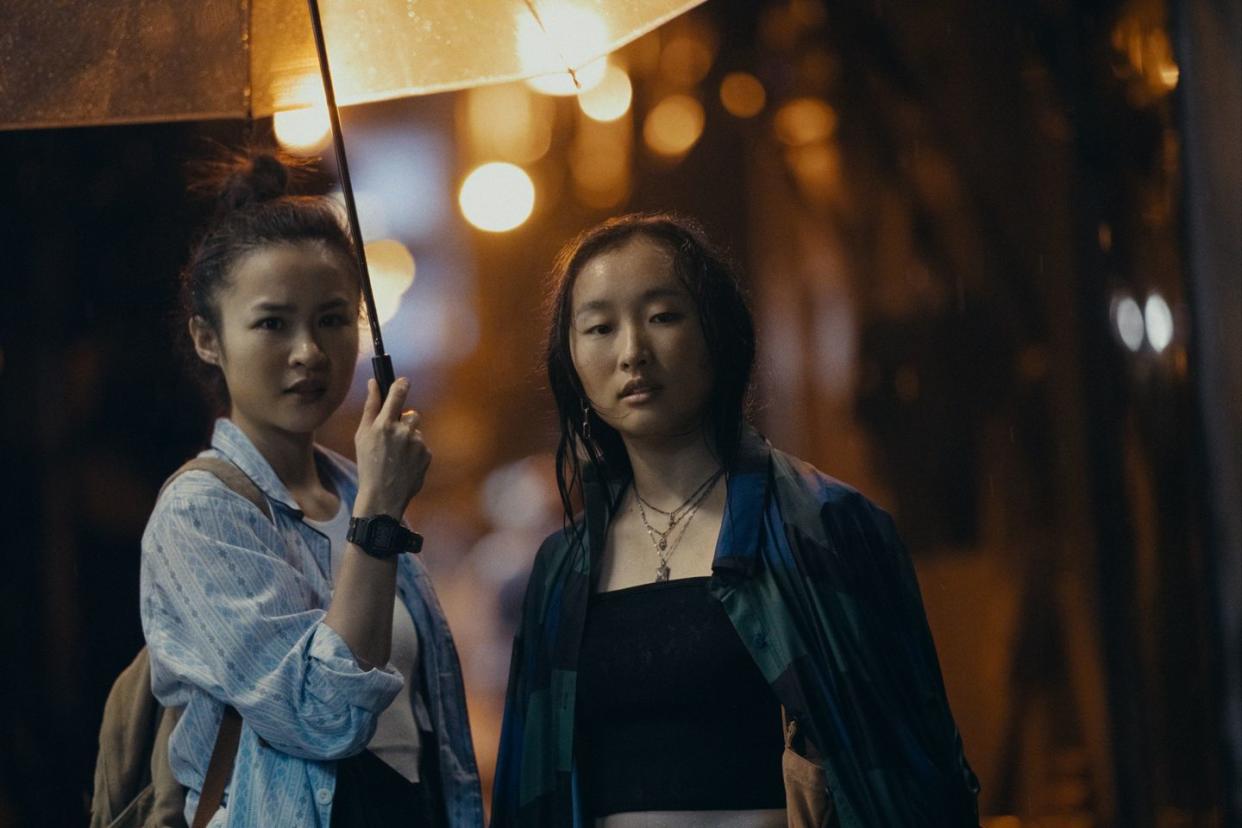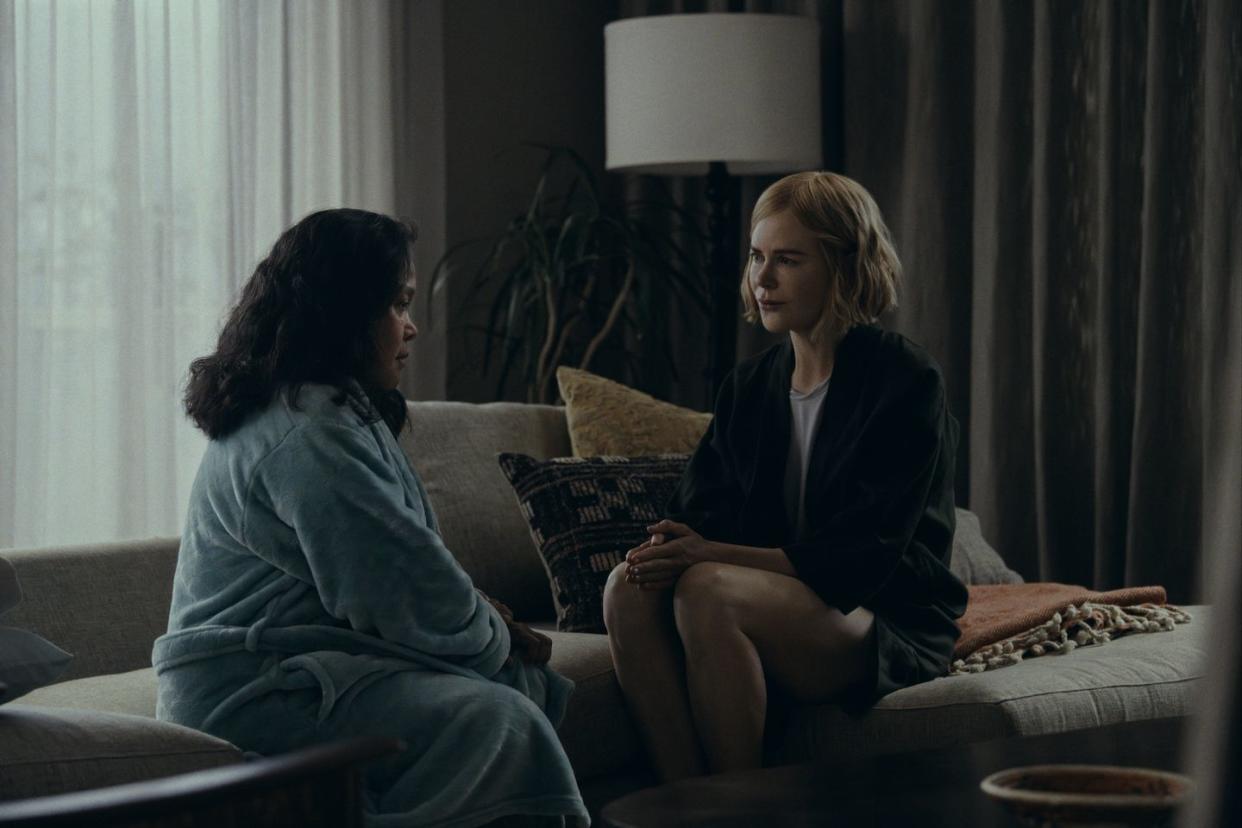“Expats” Is a Meditation on Life and Loss

"Hearst Magazines and Yahoo may earn commission or revenue on some items through these links."
When Nicole Kidman first watched writer-director Lulu Wang’s sophomore feature film, 2019’s The Farewell—which starred Awkwafina as a Chinese-American woman returning to China to visit her terminally ill grandmother—the Oscar- and Emmy-winning actor and producer knew she’d found the right auteur to spearhead an ambitious adaptation of Janice Y.K. Lee’s 1998 novel The Expatriates.
“The Farewell was funny, sad, and deeply personal, and you feel like you get to know Lulu. And with this, I was just like, ‘Just take it and do what you think is right,’” Kidman tells Harper’s Bazaar on a recent video call from New York City. “It was that simple. It wasn’t like putting parameters [on the project]. It was going, ‘We’ll do everything we can to get you the money and the time to make it the way you want to make it, and give you the writers and the support. But it has to be deeply you.’”
After initially passing on the job due to its intimidating scale, Wang agreed to come on board once Kidman convinced Amazon executives to give her complete creative control. “I think when Nicole Kidman works as an [executive producer] and she says, ‘This is the way it has to be,’ there’s a period at the end of that sentence. Just having her assurance that she would follow and let me lead, as far as the overall vision of the project, was what assured me,” Wang explains.
“I do remember our first conversation—Nicole saying, ‘This is about grief, it’s about motherhood, it’s about friendship, it’s about loss. And also, can you make it funny? I know that you can make it funny. You must make it funny,’” Wang recalls with a laugh. “And I was like, ‘Okay, no pressure!’”
The result was Expats, whose first episodes are now streaming on Prime Video. The series was Wang’s first major project since The Farewell (which she directed and wrote with an all-female writers’ room that included novelist Lee), and is as much an evocative exploration of Hong Kong’s class tensions as it is a melancholic meditation on life after loss. Set against the pro-democracy protests that roiled the region in 2014, Expats follows three American women—Margaret Woo (Kidman), Hilary Starr (Sarayu Blue), and Mercy Kim (Ji-young Yoo)—whose lives are forever changed after Mercy loses Margaret’s youngest son, Gus, in a night market.
Below, Kidman, Wang, Blue, and Yoo reflect on the diversity of cultures, languages, and lived experiences captured in their new series, and why they are far more interested in playing deeply flawed—rather than likable—women.
There’s a scene in the first episode, in which Margaret and Hilary are dancing to Blondie’s “Heart of Glass” in a restaurant, and there’s a brief moment when Margaret looks at herself in a mirror and seems to be paralyzed by her own grief. Nicole, how did you want to embody the different stages of her guilt and inner turmoil? As a mother yourself, did you find it difficult at all to turn that off at the end of the day?
Nicole Kidman: Yeah. It ebbs and flows, but what’s interesting about this role is it’s not the moments after [the tragedy and moving on from it]. It’s sort of having to live in this state of unknown without knowing. There’s no closure. There’s no “This is what happened to your son.” There’s nothing. So it’s this limbo state, which is unbearable for a human being, for a mother, for a parent. And then we explore that within the marriage [between Margaret and her husband, Clarke, played by Brian Tee] and the way the two of them handle that limbo state. [Clarke] actually needs closure to be able to move on, and [Margaret] says, “Under no circumstances, I will not give up, because I know my son’s alive.” Actually, I was glad I was the one that got to play that as the through line, because it was always like, “No, he’s out there. I just have to find him.” There’s a very proactive objective to that.
All of the women in Expats are searching for some kind of release from the existential dread of their daily lives, but they each feel trapped by their own circumstances. How did you want to calibrate your performances over these six episodes to show that these women are on the precipice of an even greater change?
Sarayu Blue: For Hilary, I was really watching a 40-year-old woman grow up, and I think that’s what I was really drawn to. We don’t often see women who are 40 and getting to know themselves. Here’s this woman who’s so pristine, so put together, so controlled, and her control is being taken away with each minute that she’s in this experience, and it’s happening more and more. She’s losing her best friend. She’s losing her husband [David, played by Jack Huston]. The ground is falling apart beneath her.
I think we really just watch her forced into this reckoning where she finally has to say, “Well, what do I want?” especially around having children, which I found so thrilling to get to explore that journey. I think it was really around her just getting to know herself better, so that she can finally live the life she wants to live, rather than the one she ended up living.
Ji-young Yoo: Lulu and I had a conversation early on about the difference between drama and comedy, and both of us agree that there isn’t really a difference between the two when it comes to the approach to the scenes. I think there’s a lot of scenes where Mercy’s funny when she probably shouldn’t be, and I think it’s more about finding the truth in what’s going on.
I think Mercy establishes pretty early on in episode one that her biggest question is: How does she move forward? A lot of it is just that arc of learning how to forgive herself—or [figuring out] if she deserves to be forgiven. Honestly, it had less to do with calibrating and more to do with just serving great writing, because the show is so well written. And Lulu will always direct it when it needs to go a different direction, if I’m heading the wrong way.
Lulu Wang: Which was very rare. You were almost always heading the right way. Working with actors who have both a sense of humor and a natural inclination for humor, even in dramatic scenes, is just the biggest blessing, because you can’t really teach that. It makes it much more dramatic when the characters have moments of levity and they’re just quirky.

Besides the obvious tragedy that will forever bind them, what else do you think connects Margaret, Hilary, and Mercy?
LW: All of them want a sense of belonging, of home, of security, of being loved. That’s just what it is to be human, so I think that when people behave and react, even when they make bad choices, it often comes from a fear of being destabilized. It comes from a place that we can all recognize. Maybe we’ve never been put in a situation where we’ve been so grief-stricken that we’re spiraling out of control, but the truth is, until you’ve been there, you don’t know. None of us can know who we truly are until you’re actually tested in these moments. So I think that’s what these three women sometimes don’t see in each other; they’re very much in their own perspective, in their own traumas.
Lulu, as an expat yourself, how did you want to capture the diversity of cultures and languages in a way that felt authentic to Hong Kong?
NK: How many languages are in the show?
LW: Cantonese, Mandarin, Tagalog, English, Korean.
SB: And Punjabi.
NK: Isn’t that amazing? I love that. That’s very rare.
LW: But very true to life. I didn’t have to reach for it. That is just a reflection of my existence in the world. I’m surrounded by people of different backgrounds and different cultures, and you see so much of your own culture in their culture. Every time I would cast an actor, I would say, “Hey, if there’s anything in the script that doesn’t ring true, please let me know. How would you say this? Do you feel like there’s any kind of stereotyping? How would you make it more interesting?”
I think really being open to having those conversations can only help you. Once it’s out in the world, it’s out in the world. But when you’re collaborating with people, if they can tell you that you’re wrong and you can make it better, why wouldn’t you do that? I think there’s often a fear on both sides. Oftentimes, people don’t want to volunteer and be like, “Excuse me, thank you for hiring me for this job, but actually, this thing is wrong.”
NK: “Here are my notes!” [Laughs.]
LW: People don’t do that. And the more you work in this industry, the more people recognize you and might be intimidated. So I have to really bring myself down and be like, “I know nothing. Tell me how to do this. This was my intention. Is there a better way to convey this intention?” Those collaborations are what made this show what it is. I want them and their families to watch the series and recognize themselves. I think there’s nothing worse than seeing yourself represented onscreen and being like, “No, that’s completely wrong.”
JY: I think the six languages in the show are also honest to Hong Kong. I feel like it was an abnormal experience if I would walk around Hong Kong and not hear at least upwards of 10 languages as I was wandering the street.
LW: And six languages in many different accents. When we were casting, we would be like, “Okay, English-speaking, but Australian-accented” or “Korean-American, but doesn’t need to speak Korean and actually sounds American.” We had all of those different specificities as we were casting actors.

Lulu, the fifth episode was always part of your initial pitch for Expats, and you’ve said it was important for you to burst that privileged bubble of expats, rather than indulging in it by showing the everyday lives of migrant workers in Hong Kong. What did you want to depict about the lived experiences of those women and the sense of community they are able to establish with other migrants?
LW: I just wanted to capture the amount of life in these women—their hopes, dreams, and fears. One thing I was really conscientious of is that when the storyteller is coming from a hierarchical place of telling the story, whether that’s poverty or tragedy, there can be an innate sense of pity. That’s how we end up with poverty porn, where we’re romanticizing the working class, and there’s this romanticization of it through the lens of somebody who actually has never lived that experience. I was really conscientious that I wasn’t bringing judgment on either side [of the class conflict].
If I’m being totally honest, there’s more joy in these communities, because people who have been through so much hardship are hilarious. Filipino people are so funny, and they remind me of Chinese people. You laugh through the pain, because it’s a tool for survival. And when you’ve never had to really fight to survive, you don’t have that in your toolbox. So, what I wanted to capture was all of the things that they have in order to survive. They have friendship, joy, laughter, and music. On Sundays, their lives are full of that, and then sometimes they’re also working to try to make extra money.
There’s an uncomfortable line that domestic workers have to toe in the show, just like in real life. On the one hand, conventional wisdom suggests that there should be a clear line that should not be crossed between an employer and their employee, but Essie (Ruby Ruiz) has raised Margaret and Clarke’s children like they were her own, and Puri (Amelyn Pardenilla) knows some of Hilary and David’s most intimate secrets.
LW: I just wanted to show the intersection and complexity of power dynamics. It doesn’t always look like somebody yelling at someone and someone being totally demeaning in an obvious way; there are these subtle and complex situations to navigate, and you don’t know how to always do it. I love that Puri is so different from Essie; [Puri] is quite self-confident and believes in her dreams, and believes that she can be friends with her employer, and then that dream gets pulled out from under her. I was trying to represent as many different points of views as possible.

It still feels rare to have a story that centers three vastly different women. They’re not always making the best decisions, and some come from more privilege than others, but they’re rendered in a way that is deeply human. Often, we will hear people discuss how likable a character ought to be, but that can be limiting, in terms of capturing the whole human experience. Has it been an intentional choice on any of your parts to have women at the center of your work who are not necessarily likable?
SB: I feel like that was a really important part of the way this particular story was told. Sometimes a character might seem likable, and then there’s a twist. I know that happens with Hilary, and it was really important to me to not get caught up in whether she was likable or not. I couldn’t really be thinking about if she was likable and relatable and [still] be serving the story.
And particularly in episode five, when it’s really about Essie and Puri, it was actually imperative to the story that Hilary is not likable in that moment. That twist helps serve Puri’s story in a very authentic and real way. And if I tried to soften it, then I’m actually not telling the story anymore. So, for me, I thought that one of the really compelling pieces to our show is that every character has moments where they are sympathetic and really relatable, and moments when they’re not so much.
LW: And by the way, that’s real life. How many people are likable all of the time? We all like to believe that we are. But is that the state of human existence, for us to all go around being like, “I hope I’m likable today”? [They all laugh.] You try to be the best person that you can, but we all make mistakes. And that’s what I wanted to portray: the specificity of their experiences that can cause them to make good choices and bad choices within that context.
SB: That’s what makes them human.
LW: Exactly.
JY: I think in the wider conversation, we get caught between good/bad, likable/unlikable, but I think most actors would agree that none of us are particularly interested in whether or not their characters are likable. They’re interested in whether or not they understand the character, and whether or not they can get the audience to understand the character or spark an emotion or serve the story. So, when it comes to whether or not women are likable, I’m just excited that the women are complex and interesting.
NK: Yeah.
SB: Yeah, dimensionality is more attractive. Human is more attractive to me.
This interview has been edited and condensed for length and clarity.
Expats is now streaming on Prime Video.
You Might Also Like
